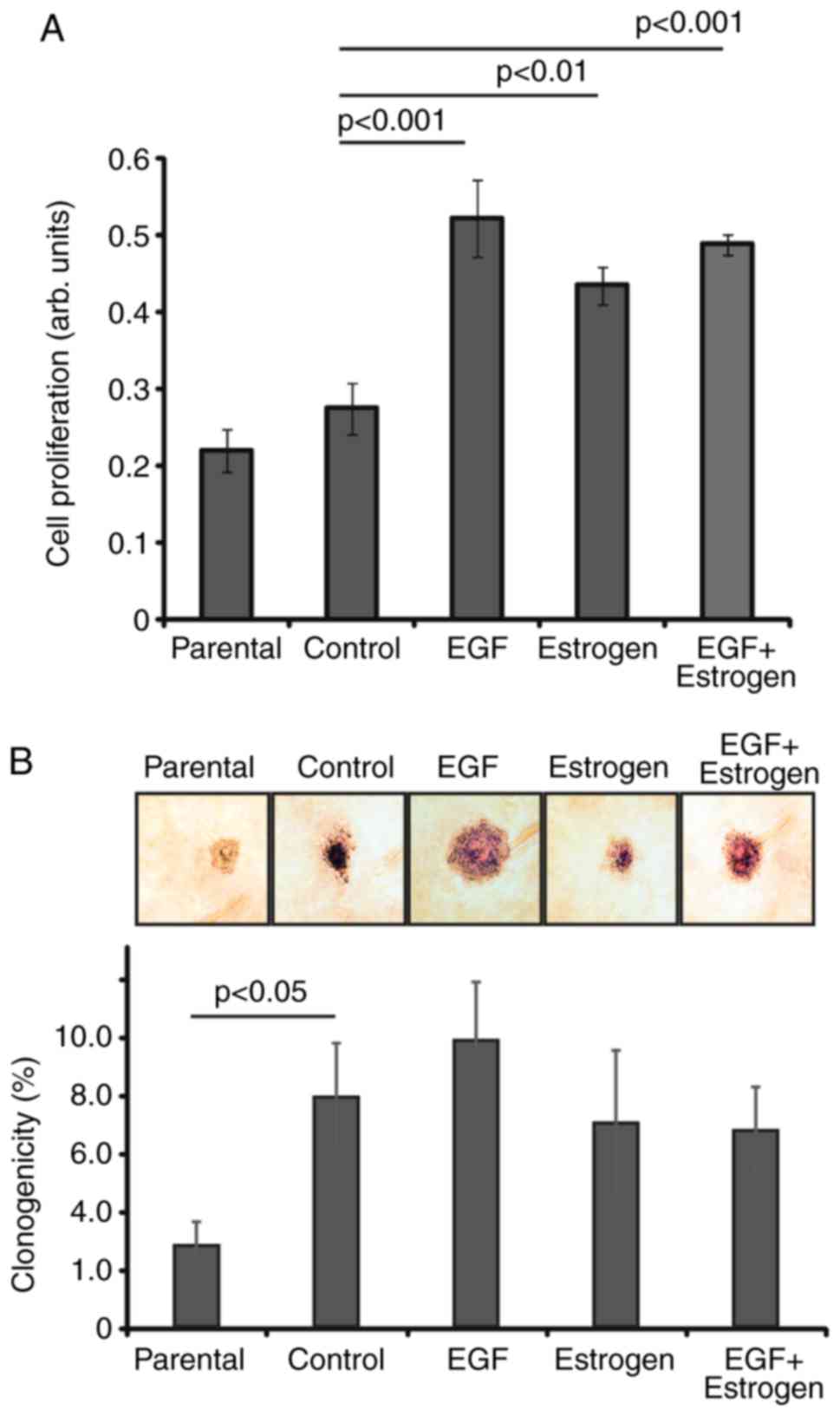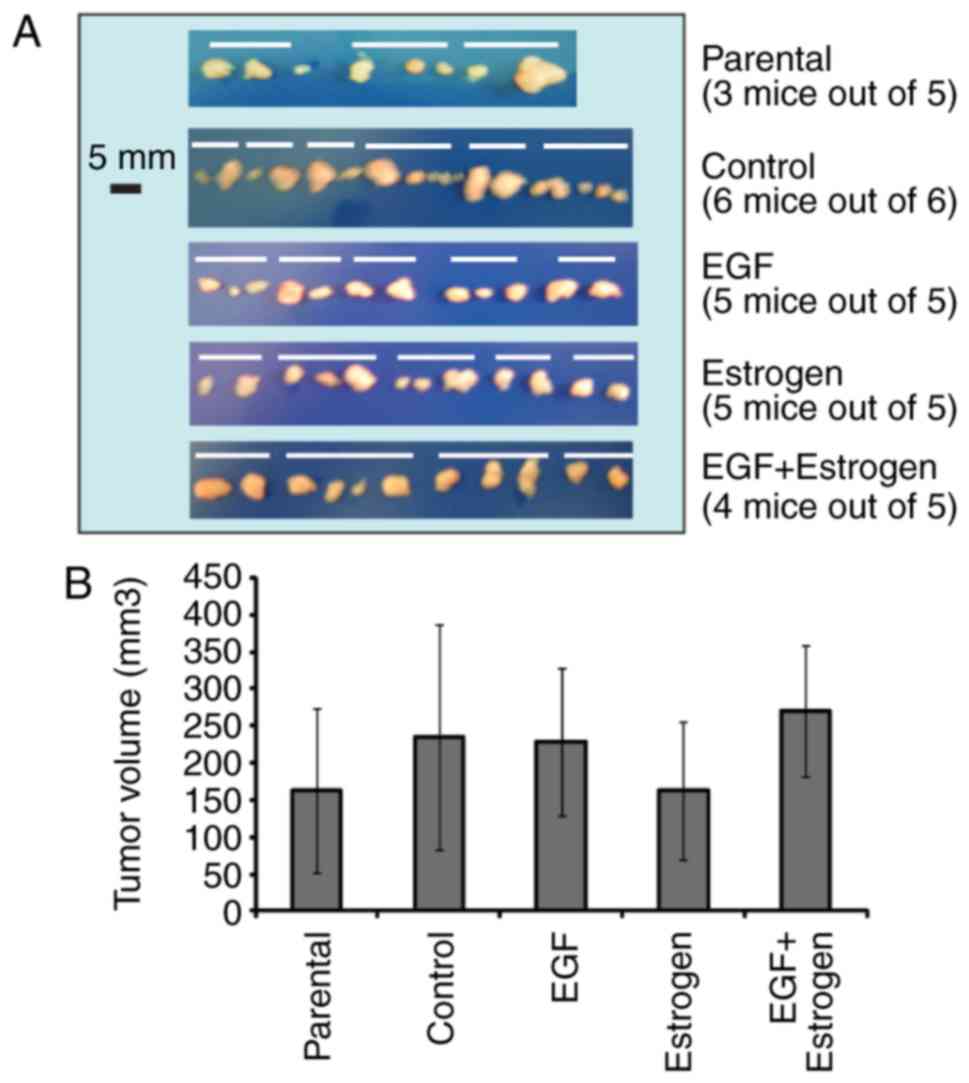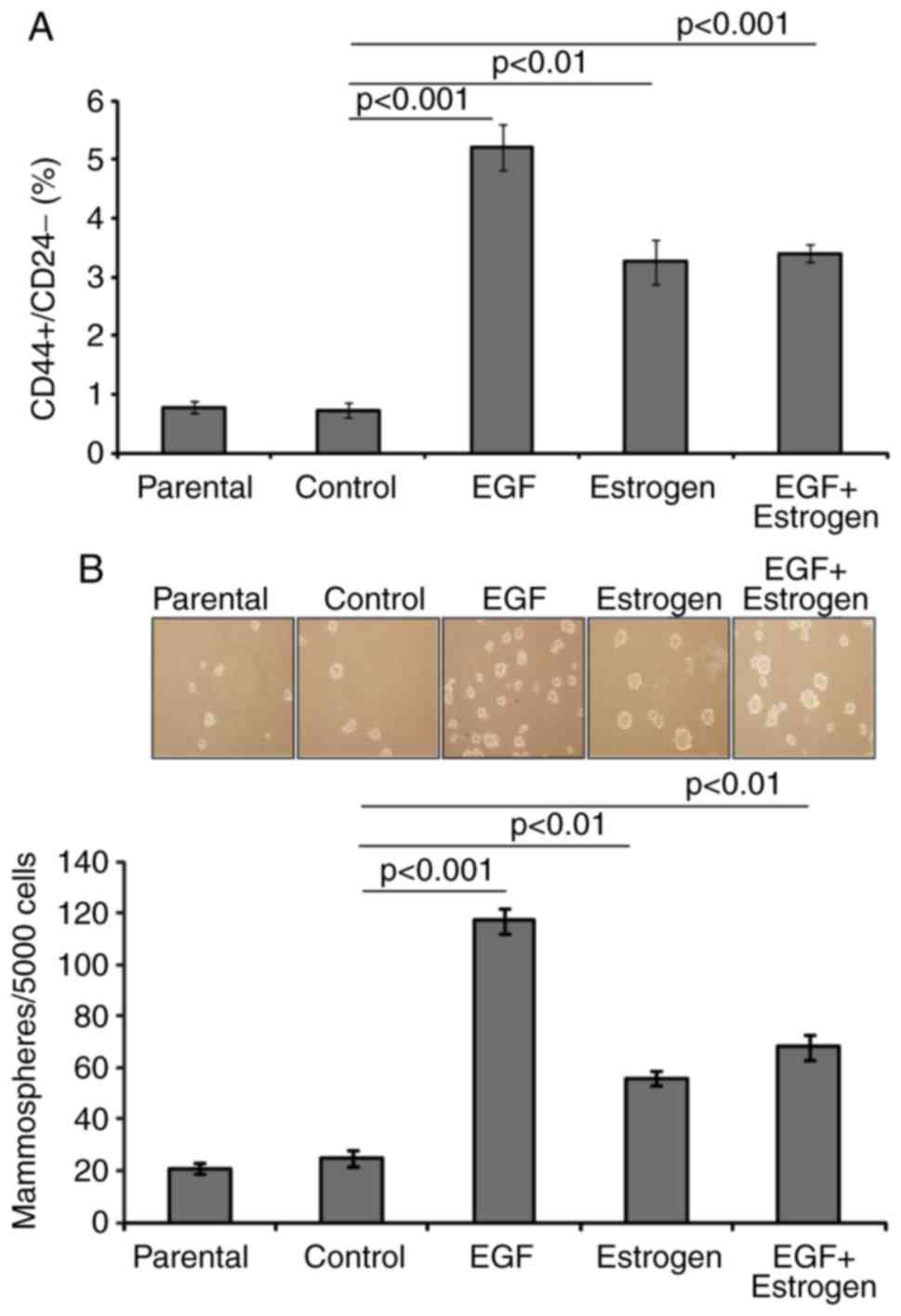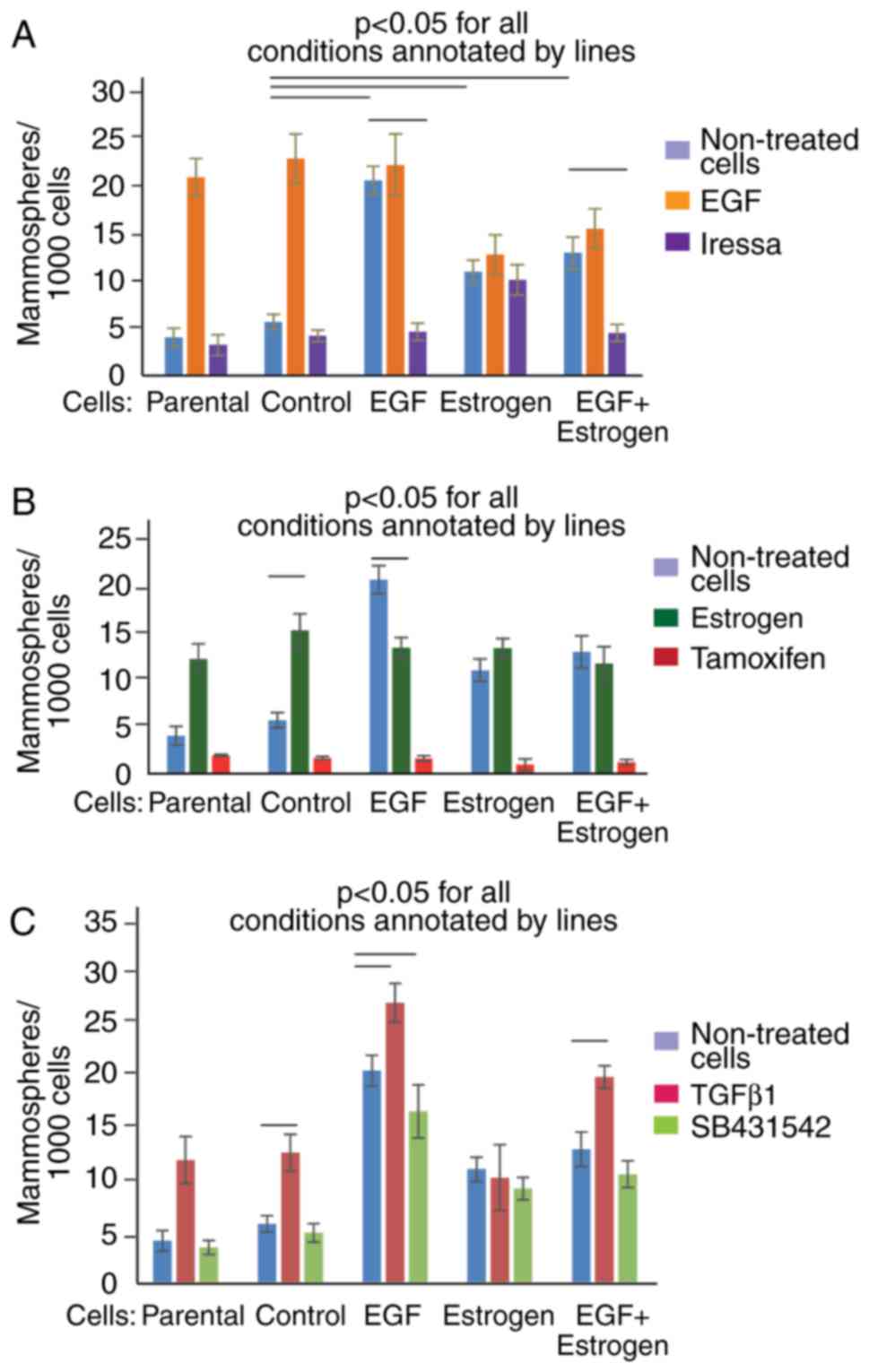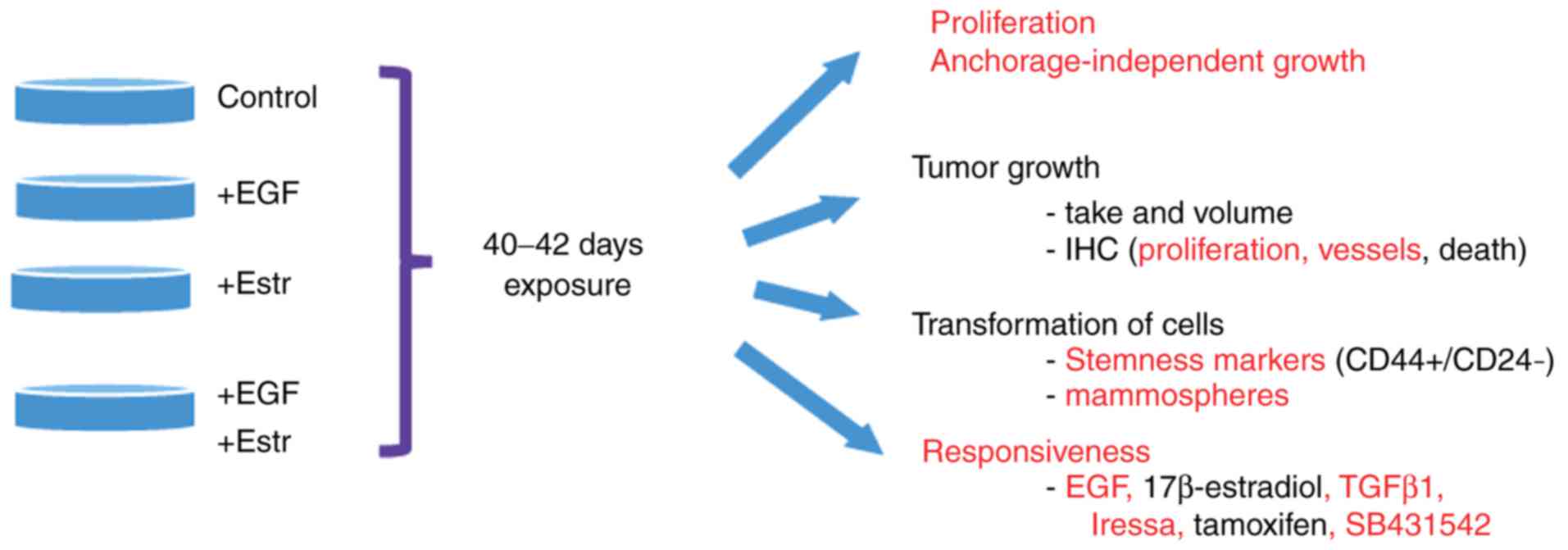|
1
|
PDQ Breast Cancer Treatment.
PDQ® Adult Treatment Editorial Board. Bethesda, MD:
National Cancer Institute. Updated 10/13/2017. https://www.cancer.gov/types/breast/hp/breast-treatment-pdq.
Accessed November 21, 2017. PubMed/NCBI2017
|
|
2
|
Patani N, Martin LA and Dowsett M:
Biomarkers for the clinical management of breast cancer:
International perspective. Int J Cancer. 133:1–13. 2013. View Article : Google Scholar : PubMed/NCBI
|
|
3
|
Masuda H, Zhang D, Bartholomeusz C,
Doihara H, Hortobagyi GN and Ueno NT: Role of epidermal growth
factor receptor in breast cancer. Breast Cancer Res Treat.
136:331–345. 2012. View Article : Google Scholar : PubMed/NCBI
|
|
4
|
Yue W, Yager JD, Wang JP, Jupe ER and
Santen RJ: Estrogen receptor-dependent and independent mechanisms
of breast cancer carcinogenesis. Steroids. 78:161–170. 2013.
View Article : Google Scholar
|
|
5
|
Voudouri K, Berdiaki A, Tzardi M,
Tzanakakis GN and Nikitovic D: Insulin-like growth factor and
epidermal growth factor signaling in breast cancer cell growth:
Focus on endocrine resistant disease. Anal Cell Pathol (Amst).
2015:9754952015.
|
|
6
|
Fouad YA and Aanei C: Revisiting the
hallmarks of cancer. Am J Cancer Res. 7:1016–1036. 2017.PubMed/NCBI
|
|
7
|
Margan MM, Jitariu AA, Cimpean AM, Nica C
and Raica M: Molecular portrait of the normal human breast tissue
and its influence on breast carcinogenesis. J Breast Cancer.
19:99–111. 2016. View Article : Google Scholar : PubMed/NCBI
|
|
8
|
Hardy KM, Booth BW, Hendrix MJ, Salomon DS
and Strizzi L: ErbB/EGF signaling and EMT in mammary development
and breast cancer. J Mammary Gland Biol Neoplasia. 15:191–199.
2010. View Article : Google Scholar : PubMed/NCBI
|
|
9
|
Katzenellenbogen BS and Katzenellenbogen
JA: Estrogen receptor transcription and transactivation: Estrogen
receptor alpha and estrogen receptor beta: Regulation by selective
estrogen receptor modulators and importance in breast cancer.
Breast Cancer Res. 2:335–344. 2000. View
Article : Google Scholar
|
|
10
|
Sukocheva O, Wadham C and Xia P: Estrogen
defines the dynamics and destination of transactivated EGF receptor
in breast cancer cells: Role of S1Ps receptor and Cdc42. Exp Cell
Res. 319:455–465. 2013. View Article : Google Scholar
|
|
11
|
Lichmer RB: Estrogen/EGF receptor
interactions in breast cancer: Rationale for new therapeutic
combination strategies. Biomed Pharmacother. 57:447–451. 2003.
View Article : Google Scholar
|
|
12
|
Arpino G, Wiechmann L, Osborne CK and
Schiff R: Crosstalk between the estrogen receptor and the HER
tyrosine kinase receptor family: Molecular mechanism and clinical
implications for endocrine therapy resistance. Endocr Rev.
29:217–233. 2008. View Article : Google Scholar : PubMed/NCBI
|
|
13
|
Moerkens M, Zhang Y, Wester L, van de
Water B and Meerman JHN: Epidermal growth factor receptor signaling
in human breast cancer cells operates parallel to estrogen receptor
alpha signaling and results in tamoxifen insensitive proliferation.
BMC Cancer. 14:2832006. View Article : Google Scholar
|
|
14
|
Clarke MF, Dick JE, Dirks PB, Eaves CJ,
Jamieson CH, Jones DL, Visvader J, Weissman IL and Wahl GM: Cancer
stem cells-Perspectives on current status and future directions:
AACR workshop on cancer stem cells. Cancer Res. 66:9339–9344. 2006.
View Article : Google Scholar : PubMed/NCBI
|
|
15
|
Al-Hajj M, Wicha MS, Ito-Hernandez A,
Morrison SJ and Clarke MF: Prospective identification of
tumorigenic breast cancer cells. Proc Natl Acad Sci USA.
100:3983–3988. 2003. View Article : Google Scholar : PubMed/NCBI
|
|
16
|
Ponti D, Costa A, Zaffaroni N, Pratesi G,
Petrangolini G, Coradini D, Pilotti S, Pierotti MA and Daidone MG:
Isolation and in vitro propagation of tumorigenic breast cancer
cells with stem/progenitor cell properties. Cancer Res.
65:5506–5511. 2005. View Article : Google Scholar : PubMed/NCBI
|
|
17
|
Fillmore CM and Kuperwasser C: Human
breast cancer cell lines contain stem-like cells that self-renew,
give rise to phenotypically diverse progeny and survive
chemotherapy. Breast Cancer Res. 10:1–13. 2008. View Article : Google Scholar
|
|
18
|
Ischenko I, Seeliger H, Schaffer M, Jauch
KW and Bruns CJ: Cancer stem cells: How can we target them? Curr
Med Chem. 15:3171–3184. 2008. View Article : Google Scholar : PubMed/NCBI
|
|
19
|
Farnie G, Willan PM, Clarke RB and Bundred
NJ: Combined inhibition of ErbB1/2 and Notch receptors effectively
targets breast ductal carcinoma in situ (DCIS) stem/progenitor cell
activity regardless of ErbB2 status. PLos One. 8:00568402013.
View Article : Google Scholar
|
|
20
|
Asselin-Labat ML, Vaillant F, Sheridan JM,
Pal B, Wu D, Simpson ER, Yasuda H, Smyth GK, Martin TJ, Lindeman GJ
and Visvader JE: Control of mammary stem cell function by steroid
hormone signalling. Nature. 465:798–802. 2010. View Article : Google Scholar : PubMed/NCBI
|
|
21
|
Fillmore CM, Gupta PB, Rudnick JA,
Caballero S, Keller PJ, Lander ES and Kuperwasser C: Estrogen
expands breast cancer stem-like cells through paracrine FGF/Tbx3
signaling. Proc Natl Acad Sci USA. 107:21737–21742. 2010.
View Article : Google Scholar : PubMed/NCBI
|
|
22
|
Suurmeijer AJ and Boon M: Pretreatment in
a high-presure microwave processor for MIB-immunostaining of
cytological smears and paraffin tissue sections to visualize the
various phases of the mitotic cycle. J Histochem Cytochem.
47:1015–1020. 1999. View Article : Google Scholar : PubMed/NCBI
|
|
23
|
Kraby MR, Opdahl S, Akslen LA and Bofin
AM: Quantifying tumour vascularity in non-luminal breast cancers. J
Clin Pathol. 70:766–774. 2017. View Article : Google Scholar : PubMed/NCBI
|
|
24
|
Von Willebra nd factor processing.
Hamostaseologie. 37:59–72. 2017.
|
|
25
|
Saadin K and White IM: Breast cancer stem
cell enrichment and isolation by mammosphere culture and its
potential diagnostic applications. Expert Rev Mol Diagn. 13:49–60.
2013. View Article : Google Scholar
|
|
26
|
Ishiguro T, Ohata H, Sato A, Yamawaki K,
Enomoto T and Okamoto K: Tumor-derived spheroids: Relevance to
cancer stem cells and clinical applications. Cancer Sci.
108:283–289. 2017. View Article : Google Scholar : PubMed/NCBI
|
|
27
|
Saxena R and Dwivedi A: ErbB family
receptor inhibitors as therapeutic agents in breast cancer: Current
status and future clinical perspective. Med Res Rev. 32:166–215.
2012. View Article : Google Scholar
|
|
28
|
Sainsbury R: The development of endocrine
therapy for women with breast cancer. Cancer Treat Rev. 39:507–517.
2013. View Article : Google Scholar
|
|
29
|
Connolly EC, Freimuth J and Akhurst RJ:
Complexities of TGF-β targeted cancer therapy. Int J Biol Sci.
8:964–978. 2012. View Article : Google Scholar :
|
|
30
|
Mints M and Souchelnytskyi S: Impact of
combinations of EGF, TGFβ, 17β-oestradiol, and inhibitors of
corresponding pathways on proliferation of breast cancer cell
lines. Exp Oncol. 36:67–71. 2014.PubMed/NCBI
|
|
31
|
Subik K, Lee JF, Baxter L, Strzepek T,
Costello D, Crowley P, Xing L, Hung MC, Bonfiglio T, Hicks DG and
Tang P: The Expression Patterns of ER, PR, HER2, CK5/6, EGFR, Ki-67
and AR by immunohistochemical analysis in breast cancer cell lines.
Breast Cancer (Auckl). 4:35–41. 2010.
|
|
32
|
Tian T, Olson S, Whitacre JM and Harding
A: The origins of cancer robustness and evolvability. Integr Biol
(Camb). 3:17–30. 2011. View Article : Google Scholar
|
|
33
|
Kitano H: Cancer as a robust system:
Implications for anticancer therapy. Nat Rev Cancer. 4:227–235.
2004. View Article : Google Scholar : PubMed/NCBI
|
|
34
|
Kubota T, Josui K, Fukutomi T and Kitajima
M: Growth regulation by estradiol, progesterone and recombinant
human epidermal growth factor of human breast carcinoma xenografts
grown serially in nude mice. Anticancer Res. 15:1275–1278.
1995.PubMed/NCBI
|
|
35
|
Kenney NJ, Bowman A, Korach KS, Barrett JC
and Salomon DS: Effect of exogenous epidermal-like growth factors
on mammary gland development and differentiation in the estrogen
receptor-alpha knockout (ERKO) mouse. Breast Cancer Res Treat.
79:161–173. 2003. View Article : Google Scholar : PubMed/NCBI
|
|
36
|
Arendt LM and Kuperwasser C: Form and
function: How estrogen and progesterone regulate the mammary
epithelial hierarchy. J Mammary Gland Biol Neoplasia. 20:9–25.
2015. View Article : Google Scholar : PubMed/NCBI
|
|
37
|
Hilakivi-Clarke L, Cabanes A, Olivo S,
Kerr L, Bouker KB and Clarke R: Do estrogens always increase breast
cancer risk? J Steroid Biochem Mol Biol. 80:163–174. 2002.
View Article : Google Scholar : PubMed/NCBI
|
|
38
|
Da Cruz Paula A and Lopes C: Implications
of different cancer stem cell phenotypes in breast cancer.
Anticancer Res. 37:2173–2183. 2017. View Article : Google Scholar : PubMed/NCBI
|
|
39
|
Lattrich C, Juhasz-Boess I, Ortmann O and
Treeck O: Detection of an elevated HER2 expression in MCF-7 breast
cancer cells overexpressing estrogen receptor beta1. Oncol Rep.
19:811–817. 2008.PubMed/NCBI
|
|
40
|
Chow A, Arteaga CL and Wang SE: When tumor
suppressor TGFβ meets the HER2 (ERBB2) oncogene. J Mammary Gland
Biol Neoplasia. 16:81–88. 2011. View Article : Google Scholar : PubMed/NCBI
|
|
41
|
Wang SE: The functional crosstalk between
HER2 tyrosine kinase and TGF-β signaling in breast cancer
malignancy. J Signal Transduct. 2011:8042362011. View Article : Google Scholar
|
|
42
|
Jia M and Souchelnytstkyi S: Comments on
the cross-talk of TGFβ and EGF in cancer. Exp Oncol. 33:170–173.
2011.PubMed/NCBI
|
|
43
|
Yamaoka T, Ohba M and Ohmori T:
molecular-targeted therapies for epidermal growth factor receptor
and its resistance mechanisms. Int J Mol Sci. 18:pii: E2420. 2017.
View Article : Google Scholar : PubMed/NCBI
|
|
44
|
Jameera Begam A, Jubie S and Nanjan MJ:
Estrogen receptor agonists/antagonists in breast cancer therapy: A
critical review. Bioorg Chem. 71:257–274. 2017. View Article : Google Scholar : PubMed/NCBI
|















